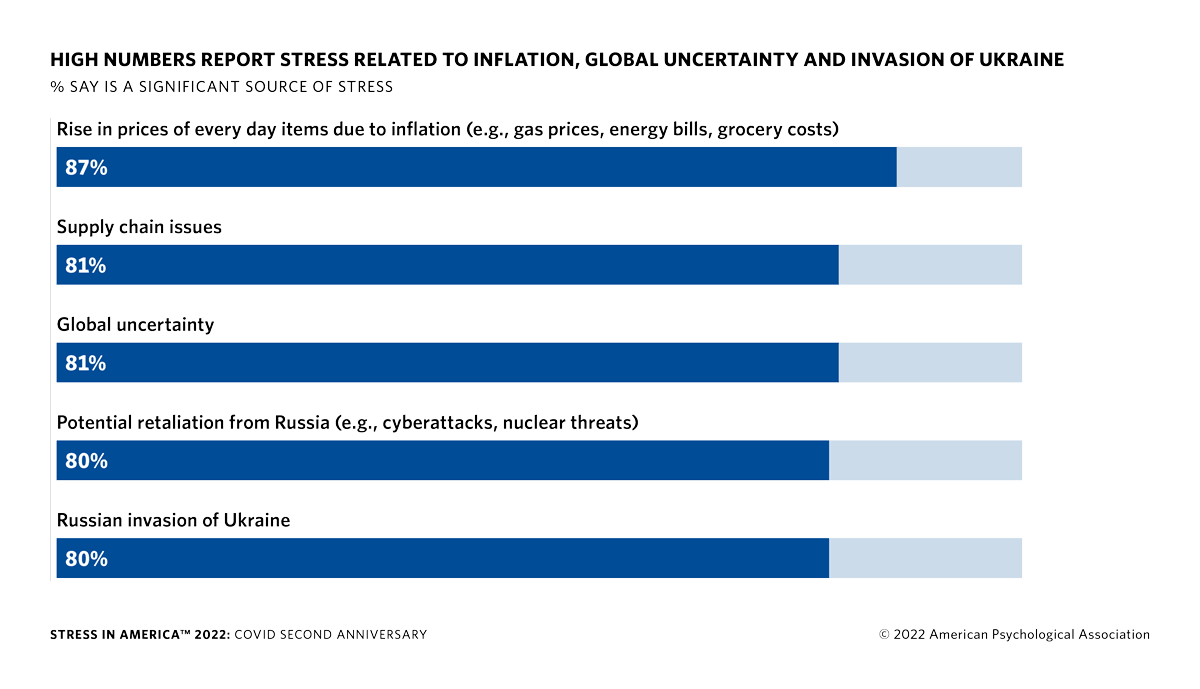By Joseph P. Merlino, MD, MPA
There is no denying that Americans are stressed. A recent poll from the American Psychological Association found that money issues and the war in Ukraine are pushing Americans’ stress to “alarming” levels. On top of the continued COVID-19 stressors and global warming, the number of issues we’re all facing in our lives right now are a lot – and it can be difficult to deal with.

As a board-certified psychiatrist at Stamford Health, I hope I can offer some strategies to help you cope during this time.
How can you tell if someone is stressed?
People react differently, some people may feel like they’ve had three pots of coffee – their hearts are beating fast, they feel jittery. Others may just feel numb and tune out what’s going on around them. Some people may resort to food or alcohol. Stress can also impact one’s ability to fall asleep or stay asleep. Everyone is different, but I think it’s safe to say right now, most Americans are experiencing stress. So what can you do about it? There are a few behavioral strategies that may help.
Helpful strategies to let go of stress and anxiety
1. Spend time with family and friends.
Typically spending time with loved ones can help people feel less stressed, though the COVID-19 pandemic has made it much more difficult to visit with family and friends – or go on a vacation. All of these factors have likely led to increased stress levels.
Try to make plans visit with people you haven’t seen in a bit. Follow COVID-19 protocols in your area, but don’t be afraid to socialize. There are safe ways to do it.
2. Get outside.
Spring is here and the weather is getting warmer – people can finally get outside a little more. Take advantage of that, while still maintaining whatever COVID-19 safety precautions are advised in your particular area. The ability to spend time in nature can help to bring stress levels down for most people.
Go for a walk. Reconnect with nature – watch birds fly, plant something, or just spend time listening to the sounds.
3. Focus on your breath.
Simply practicing quiet breathing can help to calm your mind. Whether it’s practicing yoga, stretching, praying, meditating, or watching a video to help you focus on your breath – it’s worth trying. Sit down, take a few slow, deep breaths, hold it in, then exhale slowly. If you do this a few times every day, you may feel yourself calm down.
4. Find something that helps – and make it part of your routine.
Having a routine provides us with an internal structure that can help to mitigate stress. Add whatever stress reliever resonates most with you to your daily schedule. Literally put it on your calendar and make it happen – it will be a source of comfort and support in your day-to-day routine.
5. Limit your exposure to the news.
Watching news programs 24/7 is not going to help with anyone’s stress. I recommend scheduling times to watch the news – maybe it’s a half hour in the morning and a half hour at night. Set limits and stick to them.
Instead of watching the news, watch something that makes you laugh. Laughing is time well spent.
When do you know if someone needs extra support and how can you help someone who is stressed?
If your stress is getting in the way of your functioning, for example you’re not taking care of yourself – you’re not making meals or eating, not caring for your personal hygiene, missing school, or work, or staying in bed excessively – it’s important to have a discussion with your primary care physician. If you don’t have a primary care provider, it would be a good idea to reach out to your local health organization about an outpatient program and stop in for a visit or assessment.
The bottom line is to find something that makes you feel a little less tense and try to do more of it. If you don’t know what works for you, try a variety of things and if one of them really speaks to you, make that a daily practice. Reach out to a health care professional if nothing is helping and you’re struggling.
About the Author
Joseph P. Merlino, MD, MPA is the interim chairperson in the department of psychiatry at Stamford Hospital.
Featured Expert/ Author






